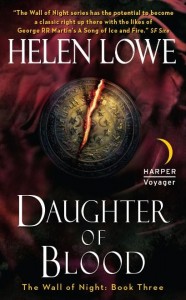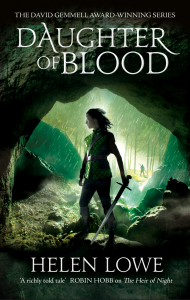Q&A Thursdays Reprised #7: Jason’s Question
Currently I’m reprising a Daughter of Blood (and by extension The Wall Of Night ) Q&A series that first featured in 2019—with some really great questions that I’m enjoying getting to read and think about again.
Today’s I’m refeaturing Jason’s question on weapons and the names thereof. 😀

USA
Jason: In The Lord of The Rings almost all the weapons have personal names, like Sting and Glamdring and Narsil. I’ve noticed you don’t do that, except for Malian’s helmet. Why is that?
Traditionally, in the major epics and sagas, only weapons that are really important have names, the name-giving being a reflection of their status. Mostly, it’s the more “individualised” weapons that have names, too, e.g. swords that are used as weapons of state and in single combats, or a spear like Aiglos that belongs to an Elven king. It’s much rarer for a pike or crossbow to have a name. The named weapons in The Lord of the Rings reflect these traditions.
In the case of the three weapons of Yorindesarinen, only the “moonbright helm”, Nhenir, has a name as opposed to an attribute. This highlights the point that Nhenir, of all the three, is “most like a person.” (The Heir of Night.) So the others are named for their attributes alone, i.e. the Frostfire Sword and the Shield of Stars, also called the Shield of Heaven. Those attributes still denote that they’re “special” in a traditional sense, especially as you’re quite right, relatively few of the other weapons are named.
The other main instance is the “black blades”, which includes both Kalan’s spear and Asantir’s swords, which she loans to Kalan. Attaching the word “black” to a class of weapons in this context ascribes mystery (night, darkness, the unseen), power (again, night and darkness, but also black belts 🙂 ), innate danger (e.g. the unlit darkness of caves and black water), death (the underworld), and prohibition (blacked out, blackballed, blacklisted etc.) While not impossible, personalised names would struggle to achieve the same end, individually and collectively. So “black blades” just worked better overall.
On the Wall of Night, too, weapons are a utility. So although some individuals may give their weapons nicknames, and a few will have proper names, the majority will not have either. Names also romanticize weapons—and although the WALL world may not be grimdark in a fantasy sense, from the outset I’ve tried not to romanticize war, its trappings (such as armor and weapons), or its effects.

UK/AU/NZ
Previous Thursday Q&A Refeatures:
March 31 — #1 Phoebe’s Question on Book Planning
April 21 — #2 Sam’s Question on Deleted Scenes
April 28 — #3 Sandy’s Question on Characters That Take Charge
May 19 — #4 Lindsay’s Question on Research
June 23 — #5 Chris’s Question on Tirael & “What Would Have Happened If…”
June 30 — #6 Rosie’s Question on the Web of Mayanne







